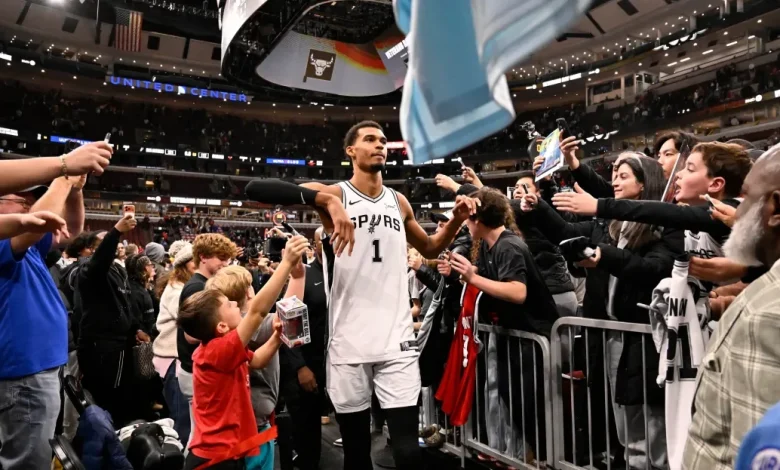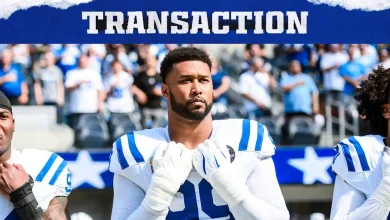How Victor Wembanyama sparked a statement win in Chicago

For nearly three quarters in Chicago on Monday, Victor Wembanyama looked ordinary – well, at least for his extraordinary standards. The 7-foot-5 forward moved carefully, probing but never truly penetrating the Chicago Bulls’ defense. He came into the game on a slump, averaging just around 17 points per game over the previous three games. His scoring touch was stifled, and his rhythm was inconsistent.
And then, as if someone flipped a switch to “on”, Wembanyama turned an average performance into a reminder of what makes him a once-in-a-generation phenomenon.
In the fourth quarter, Wembanyama scored 18 of his team-high 38 points as he dissected Chicago’s defense with a series of jumpers, drives, and finishes at the rim that transformed the tone of the game. What had been sub-par showing for the Spurs resulting in a 13-point deficit, became a Wembanyama showcase filled with his basketball skill, intelligence, and adaptability.
”I feel like experience, reps played a big role in that confidence because at the end of the day, I only have like 130 or so games in my career, and then there’s lots of things that I wish would go faster, but I just need some reps,” Wembanyama said after the game. “It’s never a straight curve, but it’s definitely trending up.”
That is what makes Wembanyama unique – even on a night where things can start slow, he is only an adjustment or two away from taking control.
Chicago entered the game a man down, missing guard Josh Giddey, but still found its shooting touch thanks to Kevin Huerter, who was hitting everything and forced San Antonio’s defense to stretch. The Bulls leaned on Huerter while also employing a unique strategy against Wembanyama: they chose not to double team him.
Instead of trapping the 21-year-old or sending help defenders, Chicago used its centers in one-on-one matchups. The plan was to use size to wear Wembanyama down, deny him an easy path to the rim, and make him shoot over bigger bodies.
- Fewer ads
- Create community posts
- Comment on articles, community posts
- Rec comments, community posts
- Coming soon: New, improved notifications system!
It worked in stints, at least for a moment. It was obvious that Wembanyama’s first steps were labored and his timing was just slightly off. But as the game went on, he began to read the coverage from Chicago differently. The space that the Bulls gave him allowed gave Wembanyama time to find his rhythm. Once he started to hit midrange jumpers, everything opened up.
The turning point came in the fourth quarter when Luke Kornet delivered a cross-court pass that found Wembanyama wide open in the corner for a three-pointer. The next trip down the floor, Stephon Castle found Wemby for a lob pass. Those two trips saw him not only release the ball with ease, but also appeared to release him from the mental block he’s had since the road loss to Phoenix on November 2.
“He walked that game down possession by possession there,” Spurs head coach Mitch Johnson said of Wembanyama. “He was just very fundamentally sound, very focused and he kind of just dominated a lot of possessions.”
From that moment on, the Bulls’ decision to stick with only single coverage on Wembanyama proved to be costly. The French phenom attacked mismatches, forced rotations, and exploited every inch of space the Bulls gave him. No matter if it was a jumper, lob at the rim, or a spin move that got a friendly bounce, he scored at will down the stretch.
Wembanyama’s final act came with under a minute to play — a deep, high-arching three over Nikola Vučević to give the Spurs a 117-114 lead. The crowd at the United Center rose to its feet — but not for the home team. As Wemby’s sixth three-pointer went through the net, sealing San Antonio’s comeback, the 21-year-old turned boos into awe.
For all of Wembanyama’s offensive brillance late in the game, his defense was just as impactful. His size and length reshaped how Chicago attacked the rim, often retreating if he was anywhere near the basket. A prime example is when Bulls guard Tre Jones had what appeared to be a breakaway layup, that is until he saw Wemby sliding into position. That forced Jones to retreat from the paint and take a much more difficult contested jumper, which he missed.
“Of course, the shots and blocks and stuff,” Johnson said. “But the communication, connecting the team defensively, it was just a really poised fundamentally sound, professional way to finish.”
Unlike other superstars in the league, Wembanyama understands that dominance does not always mean making that highlight play. His ability to control the area around him, dictate where players can go, and deter them from attacking the paint, matters more than his block streak (which is now at 95 games).
While Wembanyama was the main course of the Spurs offense, Stephon Castle was the straw that stirred the metaphorical drink. Castle finished with 19 points and 11 assists, while turning the ball over just once. He showed the patience, control, and control that Mitch Johnson preaches; pushing the pace while also understanding the spacing needed to make key passes for his teammates.
Castle’s connection with Luke Kornet on lob passes has become an but important weapon for San Antonio. His timing has sharpened, his reads are faster, and his interior passing has unlocked a way to stretch a defense. The sophmore guard’s assist-to-turnover ratio has improved, a sign he is letting the game come to him and not getting flustered.
”Our confidence is usually pretty high,” Castle said. “We have a lot of confidence in each other but especially after wins like this, it only grows.”
Building something special
The Spurs win in Chicago on Monday won’t define their season, but it does symbolize something more important: progress. This is exactly what Brian Wright envisioned for San Antonio’s future. Wembanyama controlling both ends of the floor, Castle as his sidekick, and De’Aaron Fox being the clutch time player the Spurs have needed next to Wemby.
Wembanyama’s fourth quarter was not about spectacle, it was about rediscovery. When he needed to, he found balance — between patience and aggression. For Castle, the last two games have proved that he can be the steady cornerstone for a franchise looking to return to glory for the first time in six years.
The Spurs are learning how to win. And if the game in Chicago is any indication, the lessons are starting to stick.
For an even more detailed breakdown, you can watch this excellent Hoops Tonight video, which inspired this article.





